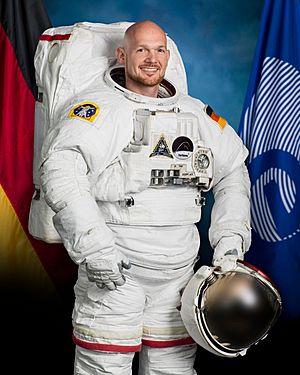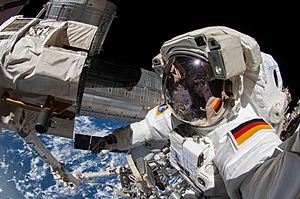Alexander Gerst facts for kids
Quick facts for kids
Alexander Gerst
|
|
|---|---|

Official portrait, 2017
|
|
| Born | 3 May 1976 Künzelsau, Baden-Württemberg, West Germany
|
| Status | Active |
| Occupation | Geophysicist |
| Awards | Bernd Rendel Prize |
| Space career | |
| ESA astronaut | |
|
Time in space
|
362 days, 1 hour, 50 minutes |
| Selection | 2009 ESA Group |
|
Total EVAs
|
1 |
|
Total EVA time
|
6 hours, 13 minutes |
| Missions |
|
|
Mission insignia
|
  |
Alexander Gerst (born 3 May 1976) is a German European Space Agency (ESA) astronaut. He is also a geophysicist, which means he studies the Earth's physical processes, like volcanoes and earthquakes. He was chosen to train as an astronaut in 2009.
Alexander Gerst has flown to the International Space Station (ISS) twice. His first trip was from May to November 2014, as part of Expedition 40 and 41. He went back to space on 6 June 2018, for Expedition 56 and 57. During his second mission, he became the Commander of the International Space Station. He returned to Earth on 20 December 2018. For a while, he held the record for the most time spent in space by an ESA astronaut, with 362 days. This record was later broken by Luca Parmitano in 2020.
Contents
Becoming an Astronaut
School and University
Alexander Gerst finished high school in Öhringen, Germany, in 1995. While he was in high school, he spent his free time helping others. He was a scout leader, a firefighter, and a lifeguard for water rescues.
He then went to the University of Karlsruhe in Germany. There, he earned a degree in geophysics with excellent grades.
Studying Volcanoes
From 1998 to 2003, Alexander Gerst worked on many science projects around the world. Some of these projects took him to very remote places, like Antarctica.
He also earned a master's degree in earth sciences from Victoria University of Wellington in New Zealand. For his master's project, he created new ways to watch volcanoes. These methods could help scientists predict when volcanoes might erupt. His findings were even published in a famous science magazine.
Later, from 2004 to 2009, Gerst worked as a researcher at the University of Hamburg. In 2010, he received his doctorate degree. His research focused on how volcanoes erupt, specifically at Mount Erebus in Antarctica.
In 2007, he received an award for his amazing research from the German Research Foundation. He has written several important scientific papers.
Training with ESA
Alexander Gerst was chosen to be an astronaut by the European Space Agency (ESA) in 2009.
In September 2019, he took part in the ESA CAVES mission. This is a special training program where astronauts explore caves to prepare for space missions. He trained with other astronauts from different countries.
In 2022, he also participated in the ESA PANGAEA training course. This course helps astronauts learn about geology and how to explore other planets. He trained in different locations, including Italy, Germany, and Spain.
First Space Mission: Blue Dot
Alexander Gerst's first trip to space was from May to November 2014. He was part of the Expedition 40 and 41 crew on the International Space Station.
On 7 October 2014, Alexander Gerst went on his first extravehicular activity (EVA), also known as a spacewalk. He worked outside the space station with astronaut Reid Wiseman. They moved a broken cooling pump and installed a new power system. The spacewalk lasted for 6 hours and 13 minutes.
On 10 November 2014, he returned to Earth. He landed in Kazakhstan with his crewmates, Maxim Suraev and Reid Wiseman.
His first mission to the ISS was called "Blue Dot". This name reminds us of how Earth looks like a tiny blue dot from far away in space, as described by scientist Carl Sagan.
During this mission, Alexander Gerst and his crew did many experiments. These included studies in physics, biology, and how the human body reacts to space. They also tested new technologies. He even made educational videos from space as part of a "flying classroom" project.
Second Space Mission: Horizons
Alexander Gerst began his second mission to the ISS on 6 June 2018. He was part of Expedition 56 and 57. For Expedition 57, he became the Commander of the ISS. He was the second ESA astronaut to command the station and, at 42 years old, the youngest astronaut to do so at the time.
During this mission, he brought a special robot assistant named "CIMON" to the station. His second mission was named "Horizons".
On 20 July 2018, while on the ISS, Alexander Gerst took part in a live concert. He joined the German electronic music group Kraftwerk from space. He spoke to the audience and even played a synthesizer during one of their songs.
On 20 December 2018, he returned to Earth with his crewmates Serena Aunon-Chancellor and Sergey Prokopyev. They had spent 197 days in space on this mission. Combined with his first mission, Alexander Gerst had spent a total of 362 days in space. This made him the ESA astronaut with the most time in space until 2020.
Hobbies and Interests
Alexander Gerst enjoys many activities in his free time. He likes mountaineering, diving, climbing, and skydiving.
He is also a licensed radio amateur, which means he can use a special radio to talk to people around the world. He has even used his radio from the International Space Station to talk to students on Earth through a program called ARISS (Amateur Radio on the International Space Station).
See also
 In Spanish: Alexander Gerst para niños
In Spanish: Alexander Gerst para niños
 | Ernest Everett Just |
 | Mary Jackson |
 | Emmett Chappelle |
 | Marie Maynard Daly |


